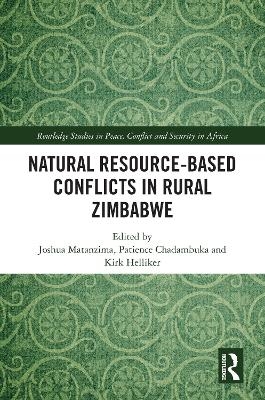
Natural Resource-Based Conflicts in Rural Zimbabwe
Routledge (Verlag)
978-1-032-54398-7 (ISBN)
This book investigates the range of conflicts over land and other natural resources in contemporary Zimbabwe, considering the different forms these conflicts take, and the ensuing outcomes.
Zimbabwe is a country rich in natural resources, including land, wildlife, minerals, and water resources. These resources are integral to the formal and informal livelihoods of most Zimbabweans, as well as supporting many key industries. Wildlife, land, and water resources are also embedded in indigenous knowledge systems, religious beliefs, and rituals in many rural communities, forming an important part of people’s identity and sense of belonging. However, this book demonstrates the ways in which rural communities are being denied access to these resources and being displaced by extractive companies and the government. Their response is often to turn to violence to try to reclaim their lands. Drawing on original empirical research from different conflicts across Zimbabwe, the book also considers the issue in the context of problems such as climate change, human-wildlife conflicts, and politico-economic crises.
This book will be useful to policy makers, students, conservationists, and academics across the fields of sociology, human geography, development, political science, and environment studies.
Joshua Matanzima is a researcher at the Centre for Social Responsibility in Mining (Sustainable Minerals Institute), University of Queensland in Brisbane, Australia. He holds a PhD in anthropology from La Trobe University, Australia. His research interests include natural resources conflicts between indigenous people, governments, and extractive companies; social aspects of mining and energy transitions; and social, environmental, and governance risks and impacts of large-scale infrastructure development and conservation projects. He has carried out extensive fieldwork on these topics in the Middle-Zambezi Valley. Patience Chadambuka is a researcher, lecturer and acting chairperson at the Department of Community Studies, Faculty of Social Sciences, Midlands State University, Zimbabwe. She holds a PhD in sociology from Rhodes University, South Africa. She researches and writes on land, livelihoods, ethnicity and gender. She has also been awarded international research grants on climate change and disability studies. Kirk Helliker is Emeritus Research Professor at the Department of Sociology, Rhodes University, South Africa, where he heads the Unit of Zimbabwean Studies, which he founded. The Unit was formed in 2015 and seeks to contribute to the development of emerging, early-career, and mid-career Zimbabwean (and other) scholars. He publishes widely on Zimbabwean history, politics, and society and has supervised a significant number of PhD and MA students.
1: Natural Resource-Based Conflicts in Zimbabwe PART A: Land, Natural Resources and Conflict 2: Domestic Communal Land Grabbing and Dwindling Peri-Urban Spaces: The Case of Midlands District’s Mataga Communal Areas 3: Natural Resource Conflicts in Western Zimbabwe 4: Othering Doma Foragers: Contestations Over Natural Resources in the Mid-Zambezi Valley 5: Women’s Land Access and Gendered Land Conflicts in Hwedza and Makoni Districts 6: Resource Conflicts in Chiredzi District: The Case of the Minority Hlengwe against Settlers and the State, 1950s-2022 Part B: Water and Conflict 7: Water as a Site of Contestation at Lake Kariba 8: Conflicts over River Sand Use and Management in Binga District 9: Conflict over Land and Water Resources in Zimunya, Manicaland Province 10: Whose Water is it? Underground Water and Social Conflicts in Fuleche, Hurungwe District, c1958-2020 11: Governance, Power Dynamics and Conflicts in Norton’s Small-Scale Fisheries 12: Conflicts over Natural Resources at Mutirikwi Dam in Masvingo Province PART C: Minerals and Conflict Chapter 13: Farmer-Miner Conflicts in Mberengwa North, 2000-2020 14: Mining-Induced Displacement and Resource Conflicts in Chiadzwa 15: Farming-Mining Conflicts surrounding Land Use on A1 Farms in Shurugwi District 16: Conflicts over Harnessing of Diamond Resources in Marange Communal Area, Eastern Zimbabwe, 2006 - 2015
| Erscheinungsdatum | 10.07.2024 |
|---|---|
| Reihe/Serie | Routledge Studies in Peace, Conflict and Security in Africa |
| Zusatzinfo | 2 Tables, black and white |
| Verlagsort | London |
| Sprache | englisch |
| Maße | 156 x 234 mm |
| Gewicht | 670 g |
| Themenwelt | Naturwissenschaften ► Biologie ► Ökologie / Naturschutz |
| Naturwissenschaften ► Geowissenschaften ► Geografie / Kartografie | |
| Sozialwissenschaften ► Soziologie ► Spezielle Soziologien | |
| Weitere Fachgebiete ► Land- / Forstwirtschaft / Fischerei | |
| ISBN-10 | 1-032-54398-1 / 1032543981 |
| ISBN-13 | 978-1-032-54398-7 / 9781032543987 |
| Zustand | Neuware |
| Haben Sie eine Frage zum Produkt? |
aus dem Bereich


